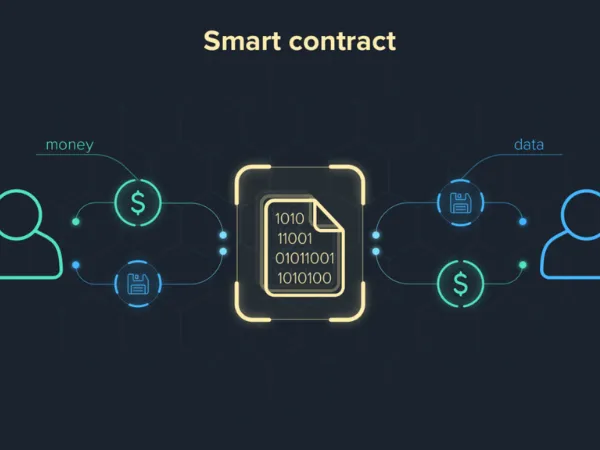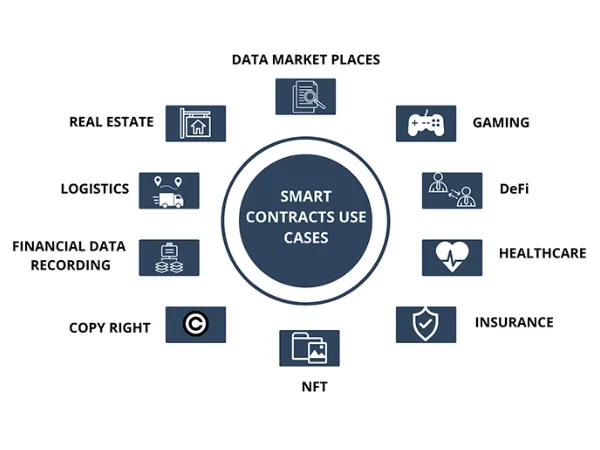Smart Contract is a term referring to a type of contract frequently mentioned in the financial market in general, but not everyone truly understands what a Smart Contract is. Let’s explore this in the following article from vietnam-ustrade.org!
What is a Smart Contract?

Smart Contract is a smart agreement, supported by Blockchain technology. This protocol can optimize the terms within the contract between two unknown parties without involving third-party intermediaries, requiring only an Internet connection.
With smart contracts, the terms and agreements in the contract are fully automated, unaffected by external influences. Therefore, smart contracts are very transparent and secure, as they cannot be tampered with or reversed, and are easily traceable.
How Smart Contracts Work
The reason why these contracts are considered “smart” is because their operation is fully automatic based on predefined programming.
Specifically, the terms of the smart contract are first written in a programming language, then encrypted into a block, which is then distributed and copied via nodes in the Blockchain network.
Subsequently, the contract is deployed after receiving the command according to the predetermined terms, and the Smart Contract will automatically verify the conditions and commitments within the contract.
Benefits of Smart Contracts
Within the Blockchain technology network, Smart Contracts are regarded as an application that provides many outstanding benefits, including:
- Automation: From contract creation to execution and liquidation, everything is fully automatic. This helps ensure transparency, security, and eliminates the risk of influence from intermediaries.
- No risk of loss: Smart Contracts are stored on a shared ledger, so users will not face the risk of losing the contract.
- Security and transparency: Any type of contract or document is secured against hacker or scam risks by Blockchain.
- Fast speed: The automatic system of Smart Contracts eliminates many unnecessary tasks, saving hours compared to traditional contracts.
- Cost optimization: By eliminating intermediaries, smart contracts effectively reduce costs.
- High accuracy: Smart Contracts ensure nearly perfect accuracy, overcoming the limitations of handwritten contracts.
- Advantages and Disadvantages of Smart Contracts
Advantages
- Smart Contracts can be applied across various fields such as Crypto, banking, logistics, real estate, or elections.
- Freedom of operation, not controlled by any authority or organization.
- Safe and transparent with optimal features.
Disadvantages
- Lack of legal enforcement: Since they are not managed by any agency, users are not legally protected if errors occur.
- Implementation costs: Deploying a Smart Contract requires expenditure for computing infrastructure, infrastructure, and hiring developers.
- Internet risk: Despite excellent security, if users accidentally disclose information, hacking risks still exist.
Conditions for Creating a Smart Contract
To create a Smart Contract, the following conditions must be met:
- Contract party: The smart contract must be granted access rights, lock, or open the listed products or services.
- Electronic signature: Both parties in the contract need to sign off on the terms in the contract content.
- Decentralized platform: After completion, the smart contract will be uploaded to the corresponding decentralized platform of the Blockchain network.
Applications of Smart Contracts Across Various Fields

Smart contracts can be applied in numerous fields, such as:
Elections
The use of smart contracts in elections helps eliminate vote tampering as votes are protected on the ledger, accessible with proper permissions.
Management
Smart Contracts are very useful for corporations and organizations to manage and store information securely and transparently with high accuracy thanks to the Blockchain ledger.
Logistics Supply Chain
In businesses, the supply chain consists of many departments, so tracking each process using conventional tools is very time-consuming and inefficient. Smart Contracts enable efficient, timely monitoring of each department’s work, preventing fraud and errors.
Additionally, Smart Contracts can be combined with the Internet of Things (IoT) networks to monitor the supply process in the Logistics chain.
Healthcare Services
Smart Contracts are applied in healthcare by encrypting and storing patients’ medical records with a private key, and automatically transmitting invoices for surgeries to insurance on the Blockchain network.
Besides these applications, Smart Contracts are also highly beneficial in banking, real estate, insurance, and other sectors.
Conclusion
Through this article on Smart Contracts, I hope to provide you with many useful insights. Wishing you a successful application of smart contracts for maximum efficiency





